The Nexus 7 (2013) Review
by Anand Lal Shimpi on August 22, 2013 6:00 PM ESTPlatform Power & Battery Life
The new Nexus 7 moves to a slightly smaller battery compared to its predecessor (15Wh vs. 16Wh). The result however is anything but a reduction in battery life. ASUS and Google worked hard to reduce platform power consumption as much as possible. I instrumented both Nexus 7s and measured total platform power, excluding display, to look at the impact of the silicon platform (SoC, PMIC, DRAM, eMMC, WiFi, etc...). The results are beyond impressive:
Idle power is cut in half compared to last year's model. This is by far the most important improvement as most mobile usage models tend to have long periods of idle time. We'll see these power gains reflected in our web browsing test which does have significant periods of simulated reading time between web page loads. The power reduction while running Kraken grows to just over 20%, and even while running Geekbench 3 we see a 16% drop with the new Nexus 7. Only our offscreen 3D test manages to draw more power on the new Nexus 7 than the old one, and that isn't taking into account the nearly 5x increase in performance on the new Nexus. In fact, as impressive as these numbers are - they are even more impressive when you take into account performance. To make a long story short, don't worry about the ~7% decrease in battery capacity as there are enough improvements in platform power and performance (and thus perf per watt) to more than make up for the smaller battery.
We'll start out with our WiFi web browsing test. Like all of our battery life benchmarks we run this test with all devices calibrated to 200 nits and connected to 5GHz 802.11 WiFi (if supported). The test itself cycles through a bunch of desktop websites at a very aggressive frequency. Our test ensures that both the CPU cores and wireless stack can reach their deep sleep states during simulated reading periods. The test continues until the battery is depleted.
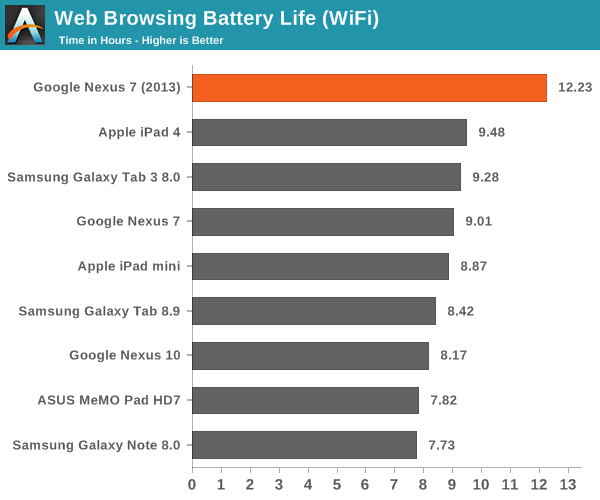
The new Nexus 7 does better here than any other small tablet we've ever tested. Remember that 50% decrease in idle platform power? That's exactly why we're seeing a 35% improvement in battery life compared to the original Nexus 7.
Our video playback test involves looping the playback of a 4Mbps 720p High Profile H.264 transcode of the last Harry Potter Blu-ray. All displays are calibrated to 200 nits.
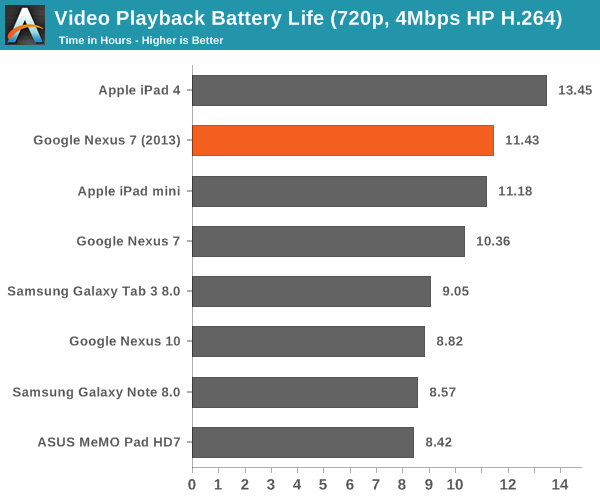
Video decode blocks are fairly well optimized to begin with, so there's not a ton of room for improvement here compared to last year's Nexus 7. Despite the ~7% shrink in battery capacity, the new model manages a 10% increase in battery life though. We also have the first small Android tablet capable of beating the iPad mini in a video playback test here - job well done ASUS/Google.
Our final test involves looping the Egypt HD benchmark until the battery is completely drained. Frame rates are capped to 30 fps to somewhat simulate actual gameplay and not penalize faster GPUs.
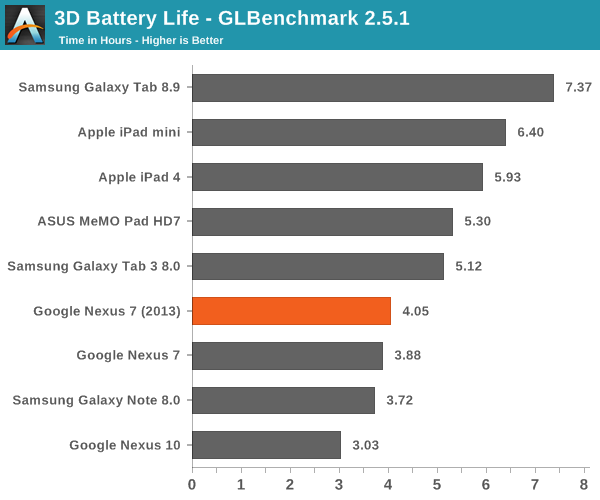
The new Nexus 7 manages to deliver slightly better battery life here despite driving higher frame rates and more pixels. Overall performance here isn't anything super impressive, the only average showing from the Nexus 7.
Google ships the Nexus 7 with an ASUS branded 7W charger, identical to the one you'd find in the box of a MeMO Pad HD7. Given identical chargers and battery capacities, there's no surprise the new Nexus 7 takes the same amount of time to charge as the MeMO Pad HD7 (~3.5 hours).
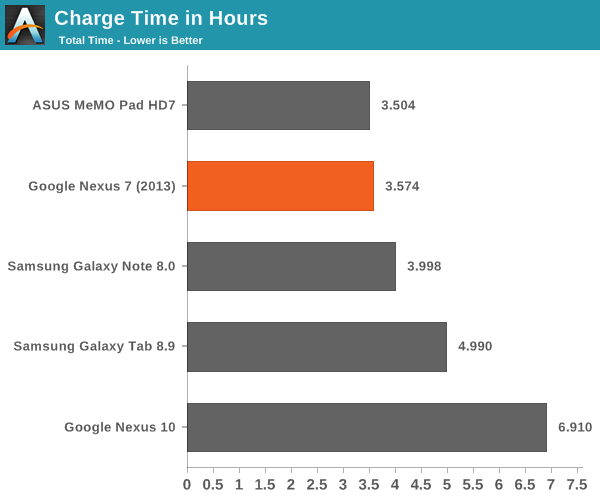
The new Nexus 7 also supports wireless charging by implementing the Qi standard. Charge time is a bit slower wirelessly as Qi can only charge at up to 5W. Brian tested Qi functionality in his mini review of the Nexus 7 and didn't have any issues.


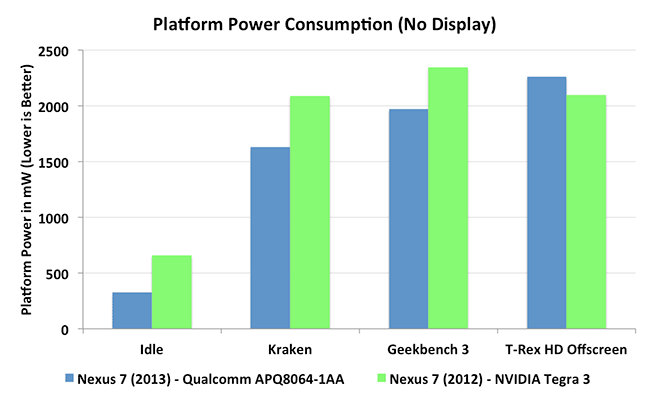
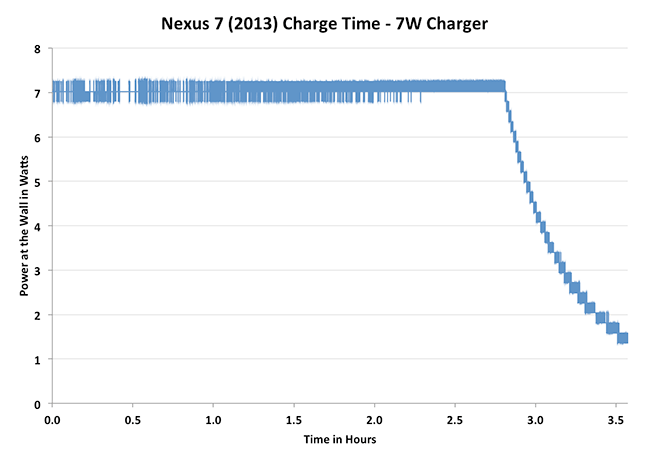








202 Comments
View All Comments
ESC2000 - Thursday, August 29, 2013 - link
I agree with everyone who is perplexed that you object to paying less. Also remember though that Asus manufactured these tablets and they certainly aren't working for no profit. I think I read somewhere that Asus gets $4 per nexus 7.... certainly not the $150 or whatever that Apple makes on each mini (not to mention the extra $100 for each storage upgrade) but it adds up.Of course they may be selling at or below cost and Google might just be paying Asus. Hopefully we won't all end up working as slaves to Google... -written from my happily-obtained at cost nexus 7 2013
jl0329 - Wednesday, October 9, 2013 - link
You are wrong on so many levels, I don't know where to begin...Arbie - Thursday, August 22, 2013 - link
Well, I may have to get used to it, but I don't want to. Hence the comment. And in what way does SD "suck"? Micro and standard SD work perfectly for me in about eight different devices, and have done so for years.
Wait - I just figured it out: you're putting the chip in backwards. Google for some help with that.
Arbie - Thursday, August 22, 2013 - link
You simply prove my point. Without a micro/SD slot you have to spend hours grinding your videos down just to fit the hardware AND keep a computer available (!!) to reload your tablet memory. That whole scenario is so infinitely more difficult than just snapping tiny chips in and out that it doesn't even parse. People - we should be bitching more about this, or we *will* have to get used to no SD.Arbie - Thursday, August 22, 2013 - link
Yeah, at about 1000x the size, weight, hassle, and fragility of a microSD card, it's not as elegant... That's exactly why we need micro/SD.BMNify - Thursday, August 22, 2013 - link
Anand will you please point out that Nexus devices are sold at-cost to the consumers, Google subsidised prices can't be compared with the other hardware manufacturers.sherlockwing - Thursday, August 22, 2013 - link
I guess Amazon doesn't count as "other hardware manufactuers" with their Kindle Fire Tablets?BMNify - Thursday, August 22, 2013 - link
Nope, Amazon doesn't count, now they can easily exit the market too if they want as their objective of cheap tablets as their delivery vehicle is achieved as mentioned by Brian Klug in one of the podcasts but they will still stay in the market so that they are not totally dependent on other ecosystems.sherlockwing - Friday, August 23, 2013 - link
If "cheap tablets as content delivery vehicle" is the Amazon model, it is the same as the Google model (use N7 to expand Android App user base, especially those that use Google Apps). If you declare "Amazon doesn't count" then Google doesn't count either by the same logic of yours.akdj - Sunday, August 25, 2013 - link
'especially those that use Google Apps'. That's the nail on the head. Google doesn't care about the 'Play Store"...in the sense of it being a money maker. Google is first and foremost an advertising company. The biggest in the world. The 'google apps' are exactly and precisely why they're selling these and their phones @ cost. It's also the same reason they release excellent iOS apps. For Google, your info...that's their gold mine. Nothing more, nothing less. Apple on the other hand IS a hardware manufacturer. Just so happens the App Store is extremely lucrative and would qualify as a Fortune 500 company on its own. As is iTunes. They make real, hard cash for those endeavors.Two completely different philosophies and goals
Amazon on the other hand...again, offering the Kindle @ cost allows for a quick and easy portal to purchase everything from diapers and peanut butter to the latest Stephen King novel or Tom Petty's new album. They're selling you a shopping bag that'll fit anything from the store (and your credit card) you'd like to buy
Just so happens...other vendors are now involving themselves attempting to compete with these two (3) different ways of thinking and running Android with their OEMs skin. Competition is good. These tablets in their current, usable and consumer available format have only been around for three years! As a 42 year old enjoyer of all things tech related, I find it a very exciting time to be involved with and 'into' technology. It's amazing what's happened in only 36 months....we've got more software available at our fingertips (with smartphones included) than any other time in history. 800,000+ apps on each platform....obviously with some parity. But just five years ago a decent game on a handheld gaming device was $59 on release! When I was a kid...my Mattell handheld football game cost my folks a good $30 bill for Christmas!
It's funny how 'religious' these OS debates have become. I own both Android and iOS devices....Work in Windows and Mac PCs...and I'm excited for everyone's press conference. How most of us that frequent Anand's site don't feel the same is beyond me. I'm just thankful the staff here is as passionate AND as objective as any human could ever be when it comes to technology review.
And to think....you don't pay a dime, most of you...to come enjoy their articles and in depth reviews anytime you choose???
Why such animosity? And why complain or argue? Debate is good...but so many of these tangent conversations seem to just 'not get it'. Seems ignorance has run rampant since the invention of the 'smart phone'....turned all of us into 'dumb people'
Just my cent and a half (I bought the new Nex7 myself...don't have a full two cents, I'm saving for the new 'mini' this fall;))